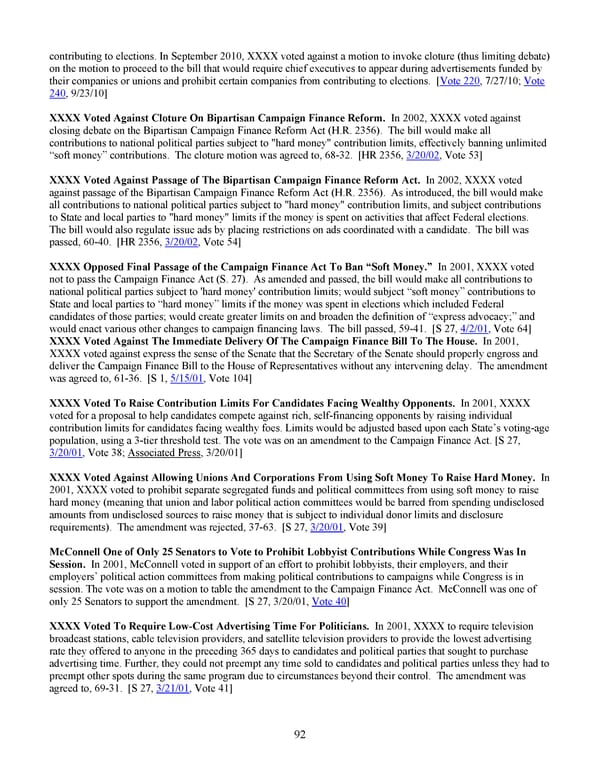contributing to elections. In September 2010, XXXX voted against a motion to invoke cloture (thus limiting debate) on the motion to proceed to the bill that would require chief executives to appear during advertisements funded by their companies or unions and prohibit certain companies from contributing to elections. [Vote 220, 7/27/10; Vote 240, 9/23/10] XXXX Voted Against Cloture On Bipartisan Campaign Finance Reform. In 2002, XXXX voted against closing debate on the Bipartisan Campaign Finance Reform Act (H.R. 2356). The bill would make all contributions to national political parties subject to "hard money" contribution limits, effectively banning unlimited “soft money” contributions. The cloture motion was agreed to, 68-32. [HR 2356, 3/20/02, Vote 53] XXXX Voted Against Passage of The Bipartisan Campaign Finance Reform Act. In 2002, XXXX voted against passage of the Bipartisan Campaign Finance Reform Act (H.R. 2356). As introduced, the bill would make all contributions to national political parties subject to "hard money" contribution limits, and subject contributions to State and local parties to "hard money" limits if the money is spent on activities that affect Federal elections. The bill would also regulate issue ads by placing restrictions on ads coordinated with a candidate. The bill was passed, 60-40. [HR 2356, 3/20/02, Vote 54] XXXX Opposed Final Passage of the Campaign Finance Act To Ban “Soft Money.” In 2001, XXXX voted not to pass the Campaign Finance Act (S. 27). As amended and passed, the bill would make all contributions to national political parties subject to 'hard money' contribution limits; would subject “soft money” contributions to State and local parties to “hard money” limits if the money was spent in elections which included Federal candidates of those parties; would create greater limits on and broaden the definition of “express advocacy;” and would enact various other changes to campaign financing laws. The bill passed, 59-41. [S 27, 4/2/01, Vote 64] XXXX Voted Against The Immediate Delivery Of The Campaign Finance Bill To The House. In 2001, XXXX voted against express the sense of the Senate that the Secretary of the Senate should properly engross and deliver the Campaign Finance Bill to the House of Representatives without any intervening delay. The amendment was agreed to, 61-36. [S 1, 5/15/01, Vote 104] XXXX Voted To Raise Contribution Limits For Candidates Facing Wealthy Opponents. In 2001, XXXX voted for a proposal to help candidates compete against rich, self-financing opponents by raising individual contribution limits for candidates facing wealthy foes. Limits would be adjusted based upon each State’s voting-age population, using a 3-tier threshold test. The vote was on an amendment to the Campaign Finance Act. [S 27, 3/20/01, Vote 38; Associated Press, 3/20/01] XXXX Voted Against Allowing Unions And Corporations From Using Soft Money To Raise Hard Money. In 2001, XXXX voted to prohibit separate segregated funds and political committees from using soft money to raise hard money (meaning that union and labor political action committees would be barred from spending undisclosed amounts from undisclosed sources to raise money that is subject to individual donor limits and disclosure requirements). The amendment was rejected, 37-63. [S 27, 3/20/01, Vote 39] McConnell One of Only 25 Senators to Vote to Prohibit Lobbyist Contributions While Congress Was In Session. In 2001, McConnell voted in support of an effort to prohibit lobbyists, their employers, and their employers’ political action committees from making political contributions to campaigns while Congress is in session. The vote was on a motion to table the amendment to the Campaign Finance Act. McConnell was one of only 25 Senators to support the amendment. [S 27, 3/20/01, Vote 40] XXXX Voted To Require Low-Cost Advertising Time For Politicians. In 2001, XXXX to require television broadcast stations, cable television providers, and satellite television providers to provide the lowest advertising rate they offered to anyone in the preceding 365 days to candidates and political parties that sought to purchase advertising time. Further, they could not preempt any time sold to candidates and political parties unless they had to preempt other spots during the same program due to circumstances beyond their control. The amendment was agreed to, 69-31. [S 27, 3/21/01, Vote 41] 92
 HRC vote skeleton Page 101 Page 103
HRC vote skeleton Page 101 Page 103